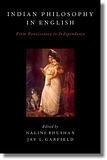Indian Philosophy in English
Bhushan, Nalini [u.a.] [Hrsg.]:
Indian philosophy in English : from renaissance to independence / ed. by Nalini Bhushan and Jay L. Garfield. - New York : Oxford University Press, 2011. - xxi, 633 S.
ISBN 978-0-19-976926-1
US$ 99,00 (Hardcover)
ISBN 978-0-19-976925-4
US$ 35,00 (Paperback)
DDC: 181.4
-- Angekündigt für Juli 2011 --
Beschreibung
This book publishes, for the first time in decades, and in many cases, for the first time in a readily accessible edition, English language philosophical literature written in India during the period of British rule. Bhushan's and Garfield's own essays on the work of this period contextualize the philosophical essays collected and connect them to broader intellectual, artistic and political movements in India. This volume yields a new understanding of cosmopolitan consciousness in a colonial context, of the intellectual agency of colonial academic communities, and of the roots of cross-cultural philosophy as it is practiced today. It transforms the canon of global philosophy, presenting for the first time a usable collection and a systematic study of Anglophone Indian philosophy.
Many historians of Indian philosophy see a radical disjuncture between traditional Indian philosophy and contemporary Indian academic philosophy that has abandoned its roots amid globalization. This volume provides a corrective to this common view. The literature collected and studied in this volume is at the same time Indian and global, demonstrating that the colonial Indian philosophical communities were important participants in global dialogues, and revealing the roots of contemporary Indian philosophical thought.
The scholars whose work is published here will be unfamiliar to many contemporary philosophers. But the reader will discover that their work is creative, exciting, and original, and introduces distinctive voices into global conversations. These were the teachers who trained the best Indian scholars of the post-Independence period. They engaged creatively both with the classical Indian tradition and with the philosophy of the West, forging a new Indian philosophical idiom to which contemporary Indian and global philosophy are indebted. [Verlagsinformation]
Inhalt
I. NATIONAL IDENTITY
1. Pandits and Professors: the Renaissance of Secular India. 3
2. Rabindranath Tagore, "Nationalism in India" (1917). 21
3. Aurobindo Ghosh, "The Renaissance in India" (1918). 37
4. A. K. Coomaraswamy, "Indian Nationality" (1909). 67
5. Lajpat Rai, "Reform or Revival?" (1904). 75
6. Bhagavan Das, "The Meaning of Swaraj or Self-government" (1921). 85
7. K. C. Bhattacharyya, "Svaraj in Ideas" (1928). 101
II. AESTHETICS
1. A. K. Coomaraswamy, "Art and Swadeshi" (1910). 115
2. Aurobindo Ghosh, "The Future Poetry" (1917-1918). 121
3. R. Tagore, "Pathway to Mukti" (1925). 151
4. B. K. Sarkar, "View-Points in Aesthetics" (1922). 165
5. K. C. Bhattacharyya, "The Concept of Rasa" (1930). 193
6. M. Hiriyanna, "Indian Aesthetics 2" (1954). 209
7. M. Hiriyanna, "Art Experience 2" (1951). 217
8. An Indian in Paris: Cosmopolitan Aesthetics in Colonial India. 231
III. VEDĀNTA
1. R. D. Ranade, "The Problem of Ultimate Reality in the Upaniṣads" (1926). 245
2. Vivekananda, "Jñāna Yoga" (1915). 269
3. A. C. Mukerji, "Absolute Consiousness" (1938). 323
4. Ras Bihari Das, "The Falsity of the World" (1940). 353
5. S. S. Suryanarayana Sastri, "Advaita, Causality, and Human Freedom" (1940). 363
6. A. C. Mukerji, "Śaṅkara's Theory of Consciousness" (1937). 393
7. V. S. Iyer, "Śaṅkara's Philosophy" (1955). 407
8. P. T. Raju, "Scepticism and its Place in Śaṅkara's Philosophy" (1937). 425
9. Bringing Brahman Down to Earth: Līlāvāda in Colonial India. 435
IV. METAPHYSICS AND EPISTEMOLOGY
1. The Plato of Allahabad: A. C. Mukerji's Contributions to Indian and World Philosophy. 455
2. A. C. Mukerji, "The Realist's Conception of Idealism" (1927). 471
3. Hiralal Haldar, "Realistic Idealism" (1930). 499
4. K. C. Bhattacharyya, "The Concept of Philosophy" (1936). 515
5. M. Hiriyanna, "The Problem of Truth" (1930). 535
6. G. R. Malkani, "Philosophical Truth" (1949). 553
7. A. C. Mukerji, "Traditional Epistemology" (1950). 583
V. A SESSION OF THE INDIAN PHILOSOPHICAL CONGRESS AT AMALNER, 1950
Symposium: Has Aurobindo refuted Māyāvāda? / Indra Sen, N. A. Nikam, Haridas Chaudhuri, and G. R. Malkani. 593
A Bibliography of Significant Work in Indian Philosophy from the Colonial Period and the Immediate Post-Independence Period. 630
Index. 639
Herausgeber
NALINI BHUSHAN is Professor of Philosophy at Smith College. She pursues research in aesthetics, the philosophy of chemistry, philosophy of mind, philosophy of language and Indian philosophy. She is co-editor of Of Minds and Molecules and of TransBuddhism: Translation, Transmission and Transformation . Bhushan is currently working on aesthetic questions raised by the work of artist Amrita Sher-Gil. Profile page.
JAY L. GARFIELD is Doris Silbert Professor in the Humanities and Professor of Philosophy at Smith College, Professor of Philosophy at Melbourne University and Adjunct Professor of Philosophy at the Central University of Tibetan Studies. He works in the philosophy of mind, foundations of cognitive science, logic, philosophy of language, Buddhist philosophy, cross-cultural hermeneutics, theoretical and applied ethics and epistemology. Profile page.
Quellen: Oxford University Press (USA); WorldCat; Amazon
Ähnlich
- Harimoto: God, Reason, and Yoga
- White: The Yoga Sutra of Patanjali
- Moksopaya ... Teil 4
- Der Weg zur Befreiung ... Buch 4
- Todd: The Ethics of Śaṅkara and Śāntideva
- Periodization and Historiography of Indian Philosophy
- Rule-Extension Strategies in Ancient India
- Kumar: Classical Vaiśeṣika in Indian Philosophy
- Diaconescu: Debating Verbal Cognition
- Mall: Indische Philosophie

